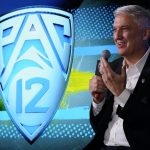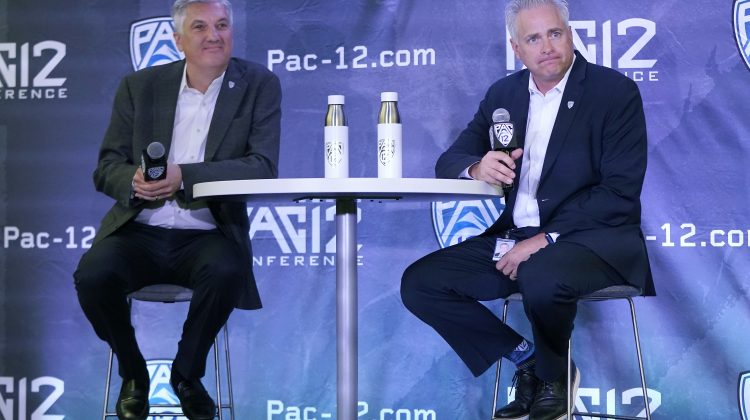The Pac-12 surprised its fans and the college sports world at large on May 13, 2021, when it named George Kliavkoff, the president of MGM Sports and Entertainment, as the seventh commissioner in conference history.
But Kliavkoff “won the first day,” according to Oregon president Michael Schill, chair of the Pac-12 board. “He got us all to like him and have that level of confidence that he had the skill set for what it would take to be successful.”
And to hear Kliavkoff’s bosses tell it, the winning streak is 364 days and counting.
“He has exceeded expectations,’’ Washington State president Kirk Schulz said. “I thought he would be a great listener and suggest new ideas, but I’m impressed by how quickly he has developed into a national leader on issues like name, image and likeness (NIL) and the alliance (with the Big Ten and ACC) and in talking to our media partners.
“The board didn’t lay all this out; he just did it. Not only has he done okay, but I’d argue that he has become a leader after what I would say were four or five years of stagnation.”
To mark the anniversary of Kliavkoff’s appointment, the Hotline reached out to three university presidents who were instrumental in the hiring process: Schill, Schulz and Washington’s Ana Mari Cauce.
Together, they form the Pac-12 executive committee, which guides the broader group of presidents and chancellors and works closely with Kliavkoff on key issues.
Schill and Schulz spoke with the Hotline, while Cauce answered questions via email.
In combination, their responses not only address Kliavkoff’s approach to challenges in the public sphere — College Football Playoff expansion, for example — but also his work behind the scenes rebuilding trust between the conference office and the campuses.
It has all unfolded during a year of change and disruption unlike anything in the history of college sports.
“I’ve used the expression about intercollegiate athletics hurtling towards the future,” Schill said, “and I can’t imagine anyone I’d rather hurtle with than George.”
Before Kliavkoff’s tenure officially began on July 1, the CFP announced its expansion plans and the Supreme Court issued a groundbreaking ruling on educational rewards for college athletes.
The day he took over the conference, NIL became the law of the land.
Three weeks later, news broke that Texas and Oklahoma would join the SEC, prompting the Pac-12 to consider expansion of its own.
Before August ended, the conference joined forces with the ACC and Big Ten to create the alliance.
Then Kliavkoff began his third month on the job.
“There’s no question in my mind that George has done an absolutely outstanding job in very difficult circumstances,’’ Cauce said.
“He approaches situations thoughtfully and strategically, has a good sense of what he knows and what he needs to learn, and a wonderful sense of when he needs to act quickly and with authority, and when he needs to consult and build consensus.”
Kliavkoff inherited a dizzying list of challenges from his predecessor, Larry Scott, with two standing above the others: Represent the Pac-12’s interest in developing a new CFP format, and negotiate a media rights deal.
CFP expansion stalled when the Big Ten, ACC and Pac-12 voted against the proposal, each for different reasons. (Kliavkoff’s focus was the revenue distribution model and the role of the Rose Bowl.)
The latter hasn’t started, at least officially. While Kliavkoff can hold preliminary discussions, the formal negotiations won’t begin until later this year. (The Pac-12’s current deal with ESPN and Fox expires in the summer of 2024.)
“It all comes down to the next media deal and getting us the resources to be successful,’’ Schulz said when asked to name Kliavkoff’s greatest upcoming challenge.
“We can talk about stop-gap measures, but does (the deal) put us in a place where the schools can invest in football and men’s basketball? Does it give us the resources to take the next step?”
Over the past 10 months, Kliavkoff has announced the formation of the Pac-12 Football Alumni Council to craft strategies for future success and the end of the conference’s expensive stay in downtown San Francisco. (A fully-remote work environment will begin next year.)
But perhaps the most significant progress has come away from the public glare as he attempts to repair the fissures that developed in the final years of Scott’s tenure.
Kliavkoff’s task was akin to a new football coach taking over a struggling team: Long before results appear on the scoreboard, the culture must change.
A clear vision is also required, and Kliavkoff has been unapologetic in his focus on winning national championships in football and men’s basketball — a stark contrast to Scott’s interest in the Olympic sports.
According to Schill, Cauce and Schulz, behind-the-scenes progress includes:
— Improving campus relations.
Kliavkoff visited each school in his first three months and continues to make appearances, whether to attend events or meet with school officials.
“George shows up at the campuses, all of them, and he’s there for a couple days,’’ Schulz said. “Nobody goes, ‘He doesn’t look like he wants to be in Pullman’ — or Corvallis or Phoenix or wherever. You hear that from the student-athletes, too. He really engages with them.
“He doesn’t come in with a lot of excuses. He showed up and listened and got a real sense for what the campus was like. Maybe it’s just Management 101, but that hasn’t been present for a while.
“He talks to people, and afterward you feel energized and optimistic. You don’t think it was a waste of time. After he has meetings on campus, I don’t have to do a lot of relationship rebuilding.”
Said Cauce: “I’d say his most important accomplishment has been gaining the trust not just among the Pac-12 presidents, but among the athletic directors and their staffs, Faculty Athletic Representatives and player representatives.”
— Shaping the narrative.
“He has changed the narrative of negativity around the Pac-12 and really brought people together,’’ Schill said.
“It’s very hard for an organization to make progress when there’s only criticism out there, when you are constantly defending, constantly rehabilitating. It’s one step forward and one back, and there’s no progress.
“I’m not saying that (media) narrative was wrong, but it’s nice not to have that narrative.”
— Rallying the conference staff.
“He has a talented staff at the conference office that I don’t think has been properly utilized,’’ Schulz said. “People thought with the (commissioner) change that we would hemorrhage staff members.
“But he has kept key people and turned around the morale. He has them looking ahead, not back. And when you get talented people moving in the same direction, it’s amazing what they can do.”
— Encouraging the presidents to invest in football.
“We talk a lot about football and what we need to do to be more competitive as a conference — and if you look at the number of new coaches coming into our conference, it’s clear that people are listening,” Cauce said.
“Kliavkoff has made it quite clear to us that the health of our conference rests on being competitive in this domain.”
— Positioning the Pac-12 as a national leader.
(Kliavkoff and SEC commissioner Greg Sankey recently met with U.S. Senators to discuss congressional oversight of the name, image and likeness marketplace.)
“I don’t think any of us see the Pac-12 as a passive entity,’’ Schill said.
“We have a brand. We care about students. We care about academic integrity. We’re not win-at-all-costs. We care about Olympic sports. We care about women’s sports. We care about racial justice.
“Most people would agree the Pac-12 embodies all that in ways that are greater than a lot of other conferences. And I think people would say the same about the Big Ten.
“We want to make sure that wherever we end up, wherever the Power Five goes, that our values lead the process, and we want George to be a player in shaping the future of intercollegiate athletics.”
*** More coverage of the Kliavkoff hire:
Q&A with Schill
Q&A with Cauce
Q&A with Schulz
Support the Hotline: Receive three months of unlimited access for just 99 cents. Yep, that’s 99 cents for 90 days, with the option to cancel anytime. Details are here, and thanks for your support.
*** Send suggestions, comments and tips (confidentiality guaranteed) to pac12hotline@bayareanewsgroup.com or call 408-920-5716
*** Follow me on Twitter: @WilnerHotline
*** Pac-12 Hotline is not endorsed or sponsored by the Pac-12 Conference, and the views expressed herein do not necessarily reflect the views of the Conference.
Related posts:

(AP Photo/Marcio Jose Sanchez)
Wilner Hotline – Pac-12 Moving Out of Bay Area
(AP Photo/Marcio Jose Sanchez)
Wilner Hotline – Commissioner George Kliavkoff Q&A: On the Pac-12 as a leader, the COVID ‘hangover’ and his first year in charge
(AP Photo/Ralph Freso, File)
Wilner – Today’s Big 12 Makeover, Impact on Pac-12
(AP Photo/Marcio Jose Sanchez)
Pac-12 survival: The downside risks, potential benefits and missing pieces within an Apple deal
